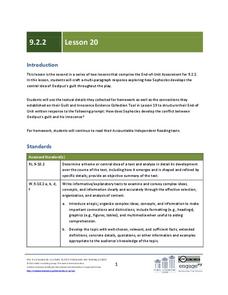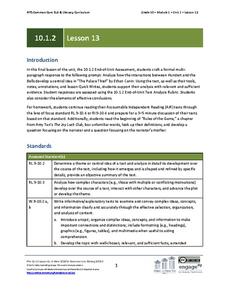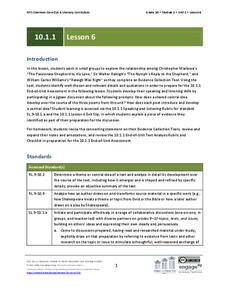PBS
A Veterans Day Thank You Note
This Veterans Day inspire scholars to say thank you to a veteran. Here, learners discover key details about a specific war using an interactive timeline, and then write a thank you letter offering their gratitude to someone who risked...
EngageNY
Grade 9 ELA Module 3, Unit 2, Lesson 12
Ninth graders synthesize their inquiry paths, research process, and claim formulation with a writing assessment at the end of the unit. Learners write a one-page perspective about their conclusions from the research process and outcomes...
EngageNY
Grade 9 ELA Module 2, Unit 2, Lesson 20
Oedipus' lack of literal and figurative vision does not mean he cannot see his guilt in the terrible fates of Laius, Jocasta, and all the lives touched by prophecy. Conclude a literary analysis unit on Sophocles' Oedipus the King with a...
EngageNY
Grade 9 ELA Module 2, Unit 2, Lesson 12
Ninth graders demonstrate their understanding of a central idea in Oedipus the King with a mid-unit writing assessment. Writers formulate a claim about the connection between prophecy and Oedipus's actions and craft an in-class essay...
EngageNY
Grade 9 ELA Module 1: Unit 3, Lesson 20
The final session in this 20-lesson plan unit asks individuals to use their Quick Writes, discussion notes, worksheets, and annotated text to craft and support a claim about how Shakespeare develops either Romeo or Juliet as tragic heroes.
EngageNY
Grade 9 ELA Module 1: Unit 3, Lesson 9
After viewing Baz Luhrmann’s depiction of Romeo and Juliet's marriage, the class listens to a recording of Act 3, Scene 1, lines 59–110. Then, groups consider how Shakespeare develops Romeo’s character through his interactions with...
EngageNY
Grade 10 ELA Module 1: Unit 2, Lesson 13
To conclude their study of Ethan Canin’s short story “The Palace Thief,” class members use their notes and annotations to craft an expository essay response to the prompt, "Analyze how the interactions between Hundert and the Bells...
EngageNY
Grade 10 ELA Module 1: Unit 2, Lesson 12
As the class concludes its close reading of “The Palace Thief,” groups consider how the narrator's character has changed throughout Ethan Canin’s short story.
EngageNY
Grade 10 ELA Module 1: Unit 2, Lesson 7
As a mid-unit assessment of a series of lessons that use Ethan Canin’s short story “The Palace Thief” as an anchor text, writers craft an in-class essay discussing how Hundert's character has developed throughout the text.
EngageNY
Grade 10 ELA Module 1: Unit 2, Lesson 6
Is history "little more than a relic," as one of the characters in "The Palace Thief" contends? Has Hundert's love of antiquity kept him from changing with the times? Readers consider how the author uses these conflicting views to...
EngageNY
Grade 10 ELA Module 1: Unit 3, Lesson 14
A thorough unit on literary analysis and character development culminates in a final writing assessment. Prompted to compare the parent-child relationships in Amy Tan's The Joy Luck Club and H.G. Bissinger's Friday Night Lights, high...
EngageNY
Grade 10 ELA Module 1: Unit 3, Lesson 9
Having prepared for an analysis essay about one of the characters from The Joy Luck Club by Amy Tan, tenth graders demonstrate their understanding in a mid-unit assessment. They focus on either Jing-Mei or Waverly in an informative...
EngageNY
Grade 10 ELA Module 1: Unit 1, Lesson 7
Can three works of literature work together to establish and develop a common central idea? Put your thoughts into writing with a final assessment focused on a unit-long analysis of Christopher Marlowe's "The Passionate Shepard to His...
EngageNY
Grade 10 ELA Module 1: Unit 1, Lesson 2
If you only read a poem once, you'll miss many levels of analysis and comprehension. High schoolers finish reading "The Passionate Shepard to His Love" by Christopher Marlowe and discuss how the poem's organization contributes to its...
EngageNY
Grade 10 ELA Module 1: Unit 1, Lesson 6
Wrap up your literary analysis unit with a discussion activity as tenth graders prepare for an end-of-unit assessment. After they have read and annotated Christopher Marlowe's "The Passionate Shepard to His Love," Sir Walter Raleigh's...
EngageNY
Grade 9 ELA Module 1, Unit 2, Lesson 4
As a mid-unit assessment, class members demonstrate their understanding of the concepts covered so far by crafting a formal, multi-paragraph essay in which they analyze how Rainer Maria Rilke's word choices develop the meaning and tone...
Maryland Department of Education
The Concept of Diversity in World Literature Lesson 9: Debating Imperialism
To gain an understanding of Imperialism, class members read Rudyard Kipling's poem, "The White Man's Burden" and Mark Twain's essay, "To the Person Sitting in Darkness." Groups compare these perceptions of non-white cultures with the...
Maryland Department of Education
The Concept of Diversity in World Literature Lesson 8: Nonfiction Close Reading
As part of their study of Things Fall Apart, class members conduct a close reading of a section of Chinua Achebe's essay, "An Image of Africa: Racism in Conrad's Heart of Darkness." Jigsaw groups then compare the voice in the essay...
Maryland Department of Education
The Concept of Diversity in World Literature Lesson 7: Cultural Commentary
As part of their study of Things Fall Apart, class groups develop a multimedia presentation in response to the question, "In what ways does Achebe use literature as a means to express and comment on culture and history?"
Maryland Department of Education
The Concept of Diversity in World Literature Lesson 4: Proverbs
"Eneke the bird says since men have learnt to shoot without missing, he has learnt to fly without perching." As part of their study of Things Fall Apart, class members read Paul Hernadi and Francis Steen's essay, "The Tropical Landscapes...
EngageNY
Grade 9 ELA Module 1, Unit 1, Lesson 17
Eighth graders demonstrate their understanding with the final assessment in a literary analysis unit based on Karen Russell's short story, "St. Lucy's Home for Girls Raised by Wolves." Having prepared for the assessment in the last few...
EngageNY
Grade 9 ELA Module 1, Unit 1, Lesson 16
Prepare for the end-of-unit assessment in a unit focused on Karen Russell's "St. Lucy's Home for Girls Raised by Wolves." As your class continues gathering evidence to support or argue against the success of Claudette's adaptation into...
EngageNY
Grade 9 ELA Module 1, Unit 1, Lesson 10
As you work through a literary analysis unit based on Karen Russell's "St. Lucy's Home for Girls Raised by Wolves," use a writing assessment to measure your class's skills. They choose one epigraph from the story to analyze and track...
EngageNY
Grade 9 ELA Module 1, Unit 1, Lesson 7
A story about feral girls raised by werewolves will have some interesting character development! Track how the girls and their teachers act, speak, and change with a lesson focused on Karen Russell's "St. Lucy's Home for Girls Raised by...

























